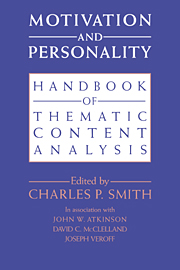Book contents
- Frontmatter
- Contents
- List of contributors
- Preface
- Acknowledgments
- 1 Introduction: inferences from verbal material
- PART I GENERAL ISSUES
- 2 Motivational determinants of thematic apperception
- 3 How do self-attributed and implicit motives differ?
- 4 Thematic analysis, experience sampling, and personal goals
- 5 Motivational configurations
- 6 Thematic apperceptive methods in survey research
- 7 Content analysis of archival materials, personal documents, and everyday verbal productions
- 8 Reliability issues
- PART II CONTENT ANALYSIS SYSTEMS
- PART III METHODOLOGY, SCORER TRAINING, DATA COLLECTION
- Appendix I Practice materials for learning the scoring systems
- Appendix II Pictures used to elicit thematic apperceptive stories
- Appendix III How to order additional practice materials
- References
- Name Index
- Subject Index
8 - Reliability issues
Published online by Cambridge University Press: 16 October 2009
- Frontmatter
- Contents
- List of contributors
- Preface
- Acknowledgments
- 1 Introduction: inferences from verbal material
- PART I GENERAL ISSUES
- 2 Motivational determinants of thematic apperception
- 3 How do self-attributed and implicit motives differ?
- 4 Thematic analysis, experience sampling, and personal goals
- 5 Motivational configurations
- 6 Thematic apperceptive methods in survey research
- 7 Content analysis of archival materials, personal documents, and everyday verbal productions
- 8 Reliability issues
- PART II CONTENT ANALYSIS SYSTEMS
- PART III METHODOLOGY, SCORER TRAINING, DATA COLLECTION
- Appendix I Practice materials for learning the scoring systems
- Appendix II Pictures used to elicit thematic apperceptive stories
- Appendix III How to order additional practice materials
- References
- Name Index
- Subject Index
Summary
Our highest allegiance is to psychology, which can best be served not by rash rejection of the projective techniques when the literature is replete with fascinating results or on the other hand by a loyal but naive faith in any given instrument, but by a serious examination of the ways in which a variety of difficult practical and research problems can be solved.
– Jerome L. Singer (1981, p. 298)Psychologists tend to be either for or against projective techniques – either convinced that they provide valuable and perhaps unique information or convinced that objective evidence does not justify their continued use. In short, there is a tendency toward “all or none” thinking. There is also a tendency to lump all “projective” techniques together even though almost 25 years ago, in an annual review chapter, Fisher (1967) urged that “we must stop reviewing projective tests as if they were an entity. They are often without meaningful overlap” (p. 166).
This chapter will deal primarily with the reliability of thematic apperceptive measures of motives, because those measures have received the most critical attention. Much of the discussion should be applicable to thematic apperceptive measures of nonmotive variables, however, and, to a lesser extent, to nonthematic content analytic measures.
- Type
- Chapter
- Information
- Motivation and PersonalityHandbook of Thematic Content Analysis, pp. 126 - 140Publisher: Cambridge University PressPrint publication year: 1992
- 16
- Cited by



